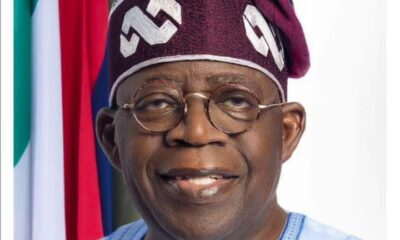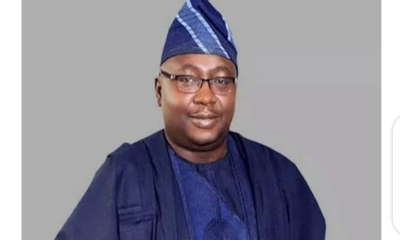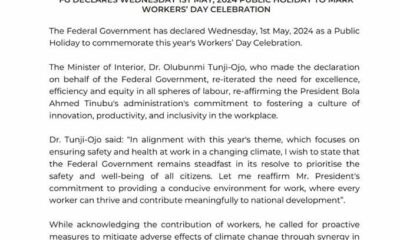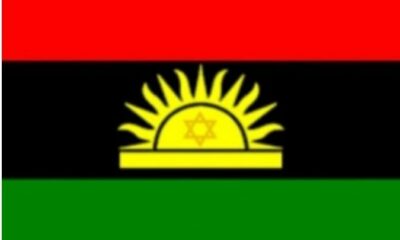Politics
Premium Times Books Unveils New Title on Cyber Politics, Nigerian Elections
By Sandra Ani


Title: Cyber Politics: Social Media, Social Demography and Voting Behaviour in Nigeria
Author: Omoniyi P. Ibietan
Print length: 460 pages
Language: English
Publisher: Premium Times Books
Publication date: June 12, 2023
Premium Times Books, the book publishing arm of the Premium Times Group, has announced the release of a new title, Cyber Politics: Social Media, Social Demography and Voting Behaviour in Nigeria.
The book, written by Omoniyi P. Ibietan, is officially making its way to physical and online bookshop Monday morning in a unique alignment with the symbolic rituals of June 12, Nigeria’s Democracy Day.
In 460 pages spread over 12 chapters, Cyber Politics: Social Media, Social Demography and Voting Behaviour in Nigeria gives expression to a critical phase within the distinct trajectory of Nigerian democracy through its elections.
Like June 12, which created a watershed in the country as Nigerians sought to rupture the yoke of military rule through the ballot, this book by Omoniyi P. Ibietan engages with another national watershed moment, as the nascent digital culture involving Internet use, and particularly the social media, converges with the articulation of voter choice, ultimately impacting Nigeria’s electoral fortunes in the process.
Nigeria’s 2015 presidential election is utilised as the sounding board from which analyses that offer great insights into the future of voting behaviour in the country are made in this new title, that is both skilful in its rendition and ground-cutting in its intellectual approach.
In an Introduction he wrote for the book, Dapo Olorunyomi, the Chief Executive Officer of the Premium Times Group, said “The universe of this new book is intriguing in its exploration of the “digital effect on elections.”
He also pointed out how Mr Ibietan’s work demonstrates “clearly that social media systems do enrich electoral democracy by expanding access to registration, participation, voting and organising at a scale we have never contemplated.”
He further observed that, “In the context of the Nigerian market framework, we also get to appreciate, through his lenses, the comparative appeal of each of the social channels. WhatsApp is the battle axe, while Twitter, hysterical though it is, remains limited.” Also, “Ibietan demonstrates how Facebook appeals to age and its abstract commitment to attention and community makes its credentials for advancing democracy a suspect.”
Equally, in his Foreword to the book, Umar Danbatta, a professor and executive vice chairman of the Nigerian Communications Commission, noted that: “the author situates the historical context of Nigerian politics and democracy” and more so “…the nexus between social media and voting behaviour, and the influence of the social media ecosystem among others in the electoral process.”
Importantly, as Professor Danbatta put it: “The book is a compelling narrative, a scholar’s guide and companion on the various political communication themes it interprets. It is difficult to put down this work once you are drawn by its alluring and free-flowing prose and incisive analysis.”
For a prominent commentator, who is also a former Minister of Information and Communication in Nigeria, Frank Nweke II, “the book represents an uncommon body of work by an intellectual visionary”, and he is of the conviction that the “extrapolation of the lessons and recommendations of this book will find perfect expression in other climes beyond the 2015 Nigerian general elections scenario.” Nweke thus commends “Dr Ibietan for this remarkable work, and…recommend(s) this book for practitioners and academics in the fields of strategic communications, new technologies, and social change.”


The author of this new book, Omoniyi P. Ibietan, holds a doctorate in Political Communication from North-West University in South Africa, and earlier degrees in Communication Arts from the Universities of Uyo and Ibadan.
With a career spanning journalism, stints in the civil society and academia, he is presently a directorate cadre staff in the Nigerian Communications Commission (NCC), where he heads the media relations management unit.
Over the past two decades, Mr Ibietan has researched deeply in the emergent interface between communication studies and psephology, which explains his richly nuanced understanding and far sight into issues involved.
Cyber Politics: Social Media, Social Demography and Voting Behaviour in Nigeria is available as physical copies both in the hard back and soft back versions in bookstores across the country from today, 12 June.
The electronic copies of the book can also be purchased on online platforms, including Amazon.
Politics
“Fuel Subsidy Removal Was A Necessary Action To Prevent Nigeria From Going Bankrupt” – President Tinubu


President Bola Ahmed Tinubu has said that fuel subsidy was removed to save Nigeria from going bankrupt.
In as much as the hardship in the country has taken a toll on both the rich and the poor, Especially the poor, President Tinubu has justification for the decision he took on fuel subsidy removal.
Speaking as one of the panelists at the ongoing World Economic Forum in Riyadh, Saudi Arabia on Sunday, April 28, Tinubu said he was convinced it was in the best interest of the people.
He said;
“For Nigeria, we are immensely consistent with belief that the economic collaboration and inclusiveness are necessary to engender stability in the rest of the world.
“Concerning the question of the subsidy removal, there is no doubt that it was a necessary action for my country not to go bankrupt, to reset the economy and pathway to growth.
“It is going to be difficult, but the hallmark of leadership is taking difficult decisions at the time it ought to be taken decisively. That was necessary for the country.
“Yes, there will be blowback, there is expectation that the difficulty in it will be felt by greater number of the people, but once I believe it is their interest that is the focus of the government, it is easier to manage and explain the difficulties.
“Along the line, there is a parallel arrangement to really cushion the effect of the subsidy removal on the vulnerable population of the country. We share the pain across board, we cannot but include those who are vulnerable.
“Luckily, we have a very vibrant youthful population interested in discoveries by themselves and they are highly ready for technology, good education committed to growth.
“We are able to manage that and partition the economic drawback and the fallout of subsidy removal.”
As a Nigerian citizen, what do you think about the Government’s decision to avert bankruptcy by removing fuel subsidy?
Politics
Enugu State Government Flag Off Palliative Distribution In The State


The Governor Of Enugu State, Peter Mbah has pioneered the distribution of food to the people of the state who are in dire need. He said this is in collaboration with the Federal Government to reduce the economic hardship in the country.
Via his social media platform, He wrote;
“Earlier today, we flagged off another round of palliative distribution in our state.
This is a collaborative effort between our administration and the federal government to cushion the effects of the economic hardship in the country.
I have directed the committee in charge of the palliative distribution to ensure that the items get to those in dire need of them.”
Here are pictures from the palliative distribution flag off.










Politics
Governor Of Delta State, Sheriff Oborevwori Visits Fled Community Of Okuama, Calls Indigenes To Return Home


Delta State Governor, Sheriff Oborevwori has visited Okuama with an assurance for the safe return of the indigenes who fled the community in the wake of the crisis that ensued in the month of March.
The Governor who was accompanied by some government officials, reiterated that innocent citizens would not be made to suffer for what they know nothing about.


Recall that seventeen officers and soldiers of the Nigerian Army were killed in Okuama community on the 14th of March, 2024, a development which made the people of the community to flee for fear of being attacked.
Recall we once reported how the stranded people of Okuama have been hiding and dwelling in the forest after the attack carried out the Nigerian soldiers who came for a peace call.
The Governor has now assured Indigenes to return as the community is safe for them.
The visit of the governor is coming one month after the killing of the military personnel.
-



 Politics4 days ago
Politics4 days ago“Fuel Subsidy Removal Was A Necessary Action To Prevent Nigeria From Going Bankrupt” – President Tinubu
-



 News4 days ago
News4 days agoFuel Price Skyrockets To ₦1000 Per Litre In Some States As Scarcity Sets In
-



 News3 days ago
News3 days ago“There Would Be total Blackout For Three Months If Electricity Tariff Hike Is Not Implemented ” – Minister Of Power Warns
-



 News2 days ago
News2 days agoFG Declares May 1st Public Holiday To Mark Workers’ Day
-



 News2 days ago
News2 days agoNigerians Seek Woman Who Spoke Out Eloquently Against Fuel Scarcity In Viral 1994 TV Clip
-



 News20 hours ago
News20 hours agoAnambra State Government Arrests Man For Marrying Off His Underage Daughter
-



 News9 hours ago
News9 hours agoIPOB Declares May 30th As Sit-at-home Day Across The Southern East States To Honour Biafran Fallen Heroes






